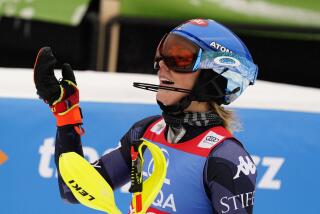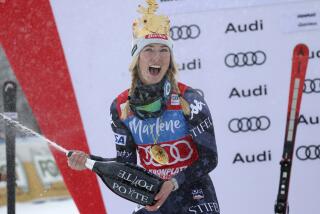Star of the White Circus : Italy’s Alberto Tomba, Enjoying Extraordinary Season, Eyes First Overall World Cup Skiing Title
- Share via
BOLOGNA, Italy — At times, at his best, he appears to be levitating through the race course, his skis hovering a few centimeters off the ground as if on a magnetic buffer. At times, he is capable of execution and grace that others only dream of. One thing is certain: We are witnessing one of the most sublime and consistent exhibitions of ability in the history of sport.
This has been an altogether extraordinary season for Alberto Tomba, a season in which he will probably win his first overall World cup title. Never, in his eight-year World Cup career, has the 28-year-old Bologna native skied so wisely, or so well.
“Everything is going so smoothly,” Gustavo Thoeni, the three-time World Cup titlist who has coached Tomba since 1990, said after Tomba’s most recent victory Feb. 4 in the giant slalom at Adelboden, Switzerland. The victory brought Tomba’s World Cup point total to 1,050, 480 ahead of Slovenia’s Jure Kosir.
“We made a few adjustments at the beginning of the season,” Thoeni said. “But that isn’t the reason. Alberto got off to a good start, and just kept on going.”
Besides sweeping the first seven slaloms of the season--a feat that ties a record set by Luxembourg’s Marc Girardelli and Swedish legend Ingemar Stenmark--Tomba also has triumphed in three of five giant slaloms. The 10 victories are a personal best for Tomba, whose previous high was nine. And although Stenmark once won 13 races in a season, 1978-79, the three-time overall World Cup winner accomplished the feat in 20 starts. Tomba has entered only 12 races.
And to think that Tomba’s season began so quietly, the three-time Olympic gold medalist logging the 21st-best time in the first run of the season’s opening race, a giant slalom at Tignes in France on Dec. 3. Tomba, who had not won a giant slalom in 18 months, skied so insipidly as to convince even the most loyal Tomba fans that their hero no longer was competitive in the event.
And then came the second run.
Tomba was transformed into a comet, hurtling through the course, determined, shifting his weight gingerly from one ski to the other so as to glide through the wide, angled gates that had always been his downfall. Setting the best time in the second run, Tomba climbed an unprecedented 17 places in the standings and finished fourth.
The next day, on a flat, easy slalom course not particularly suited to his characteristics, Tomba rallied from a deficit of .17 of a second and skied a perfect second run, winning the season’s first slalom.
“I knew Alberto was fit, physically and mentally,” Thoeni said after the race. “This summer he skied over 5,000 gates. And he missed just three of them. He is very sure of himself.”
The following week, at Sestriere, Italy, Tomba won his second slalom in a night race followed by 6.4 million Italian spectators, an 88% share of the prime-time TV audience. When a bruised rib forced him out of the Dec. 18 giant slalom at France’s Val D’Isere, Tomba bounced back two days later with one of the most impressive performances of his career in Lech, Austria, winning his third consecutive slalom and finishing 1.49 seconds ahead of Austria’s Thomas Sykora.
More important, he won on a course blanketed with soft, fresh snow, a surface on which he, with his 200-pound frame, had always been at a disadvantage. Instead of sinking, as he sometimes had, Tomba skimmed down between the gates as if skiing on mist. Ruts and moguls that had tripped up his competitors seemed to smooth out beneath his skis like butter under a knife.
“He’s incredible,” Sykora admitted, happy to have beaten the mortals in the field. “When he skis like this, the only person who can beat Tomba is Tomba.”
Tomba did his best to defeat himself in the following day’s slalom. But even he couldn’t do it. Leading by an astronomical two seconds halfway through the second run, Tomba got caught off balance going into a wide lateral gate. Braking hard, he dug his ski tips into the snow, catapulting wildly to the left.
Somehow, he maintained his balance, slipping through the gate while perched precariously on one ski, like a circus bear. But the acrobatics had put him downhill too far for the next right gate. Using all of his power, Tomba braked to a stop, bouncing off the tails of his skis and back into the fall line.
“Ein grosser fehler,” cried the excited course announcer over the loudspeaker. “A major mistake.”
Still, even with the error, Tomba won the race, his fourth in a row.
Then, on Dec. 22, in Alta Badia, Italy, Tomba won his first giant slalom in 18 months, skiing with the confidence that had won him two Olympic gold medals in the specialty. Two weeks later, in Kranjska Gora, Slovenia, he made it two for the season.
With defending World Cup champion Kjetil Andre Aamodt struggling to find his competitive edge, and Girardelli, the five-time World Cup titlist, woefully behind in conditioning, the Tomba camp began to talk publicly about this year’s title.
“Alberto can definitely win the World Cup,” said Giorgio D’Urbano, Tomba’s trainer since 1990. “But he has to do it this way, by winning all of his races. The others have four specialties where they can pick up points. We only have slalom and giant slalom.”
This is not the first season in which Tomba has made a run at the overall title. In 1990-91, he lost to Girardelli, who also competes in downhill and super-G, by only 20 points. Nor is this the first season in which Tomba, who now boasts 43 World Cup race victories, has dominated his specialties.
Yet never before has Tomba demonstrated such tactical and technical maturity. His earlier victories were the products of his prodigious gifts of strength, agility and reflexes. He was a force of nature, a phenomenon generating victory out of raw talent, a talent that just as often betrayed him.
This season, Tomba has learned how to minimize his risks. An instinct developed over eight years of competition tells him just how much he needs to press to set the winning time. He gets off the accelerator through large sections of the course, only to pick up the tempo in those nine or 10 gates where he knows he can make a difference.
“He is so far ahead of the others, he can afford to take it easy when he needs to,” D’Urbano said.
But the responsibility of winning, and the overwhelming attention and demands of the media, are beginning to wear on the star of the white circus. Tomba is no longer the insouciant playboy who partied in a Calgary discotheque the night before he won his first Olympic gold. He is older now.
And although he still performs his postrace histrionics for the thousand of Italian fans who follow him across the continent, he also suffers having to live his every moment in grand, public style. In a way, he has become a prisoner of his personality.
“I can’t continue,” he confessed before his first run at Adelboden. “Everyone wants to talk to me. This one for half an hour. This one for 10 minutes. I just can’t do it.”
The strain was evident, both in his expression, and more significantly, in his skiing. Appearing stiff and hamstrung on the second run, Tomba was .20 of a second behind Kosir as he took the plunge into the steep, imposing wall into which the last eight gates had been planted. Kosir, hoping for his first victory of the season, watched from the finish line.
“I didn’t need to look at the clock,” said the 22-year-old Slovenian, who is Tomba’s best friend on the tour. “I knew from the line he cut through the final gates that he had won. Only he can ski like that. No one else can follow that trajectory.”
It didn’t matter that the margin of victory was only .07 of a second. Tomba had won again.
“Along with ability and hard work, you need a little luck,” said the sage Thoeni. “From a skiing point of view, there is no difference between finishing .07 ahead or .07 behind. When things are going well, you win.”
But how long can things go well, or as well as they have gone? The pressure on Tomba mounts with each race he wins. After the Adelboden race, Alberto unburdened his heart.
“I’m tired of having to win all my races,” he said. “I’m even tired of winning. Girardelli has 12 races left. I only have four. Yet there he is, breathing down my neck. I win 10 times and have 1,050 points. He hasn’t won a thing, and he has 563. You’ll see. History will repeat itself.”
Last weekend, Tomba left for Japan and the slalom and giant slalom scheduled Saturday and Sunday at Furano. And then, while most of his adversaries travel to Canada’s Whistler Mountain, Aspen, Colo., and Kvitfjell, Norway, for six speed races, Tomba and his team will try to regain their energies for the season finale at Bormio, Italy.
“I believe that rest can be a positive thing,” said D’Urbano, an innovator in ski and athletic training. “Let the others knock themselves out in the downhills and super-G races. We’re going to take it easy for a while. And when it comes time to ski our final two races in Bormio in March, we’ll be ready.”
More to Read
Go beyond the scoreboard
Get the latest on L.A.'s teams in the daily Sports Report newsletter.
You may occasionally receive promotional content from the Los Angeles Times.






